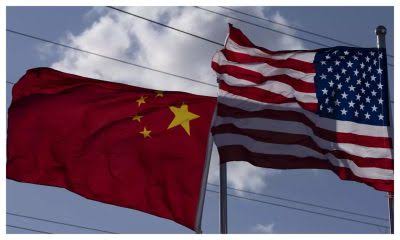Economy
Nigeria recorded N5.81tn trade surplus in Q3 – NBS

Nigeria has recorded a trade surplus of N5.81tn in the third quarter of 2024, reflecting a remarkable rise in export earnings, according to the latest data from the National Bureau of Statistics.
However, the surplus recorded in Q3 2024 is far lower than the N6.95tn trade surplus recorded in the previous quarter.
The NBS in its foreign trade statistics report on Friday noted that Nigeria’s merchandise trade for the Q3 2024 was a total value of N35.16tn, marking an 81.35 per cent increase compared to the same period in 2023 and a 13.26 per cent rise from the previous quarter.
Total exports for the quarter surged by 98.00 per cent to N20.49tn, compared to N10.35tn in Q3 2023.
This marks a 16.76 per cent increase from N17.55tn in the preceding quarter, Q2 2024.
The NBS report read, “Total exports in Q3 2024 were valued at N20.49tn, reflecting a 98.00 per cent rise compared to N10.35tn in the corresponding quarter of 2023 and a 16.76 per cent increase compared to N17.55tn in Q2 2024.”
The significant boost in exports was primarily driven by Nigeria’s crude oil and natural gas exports, which remain key contributors to the country’s foreign exchange earnings.
Crude oil exports alone amounted to N13.41tn, a 57.06 per cent increase from N8.54tn in Q3 2023.
Exports of other oil products, including liquefied natural gas and petroleum gases, also saw a massive 303.93 per cent rise, totalling N4.58tn.
In addition to oil exports, agricultural exports saw an extraordinary increase of 301.87 per cent, reaching N884.07bn, compared to N219.99bn in Q3 2023.
This growth was despite a slight decline of 9.20 per cent from the previous quarter.
Exports of solid minerals and manufactured goods also performed well, rising by 86.58 per cent and 419.93 per cent respectively.
Spain was Nigeria’s largest export partner in Q3 2024, followed by the United States, France, the Netherlands, and Italy.
These countries benefitted from Nigeria’s crude oil, LNG, and other petroleum exports.
On the imports side, Nigeria’s total import bill for Q3 2024 stood at N14.67tn, an increase of 62.30 per cent from N9.04tn recorded in the same period in 2023.
Compared to the previous quarter, imports rose by 8.71 per cent.
The report read, “The value of total imports stood at N14.67tn in the third quarter of 2024, representing a rise of 62.30 per cent from the value recorded in the corresponding quarter of 2023 (N9.04tn) and increased by 8.71 per cent compared with the value recorded in Q2, 2024 (N13.5tn).”
The rise in imports was driven largely by manufactured goods, which increased by 76.44 per cent to N6.98tn, and raw materials, which saw a 66.11 per cent rise to N1.58tn.
Other notable imports included agricultural products, valued at N882.24bn, reflecting a 37.06 per cent increase from Q3 2023.
China continued to dominate Nigeria’s import trade, followed by India, Belgium, the United States, and Malta.
Key imported goods included motor spirit, gas oil, durum wheat, and used vehicles.
Economy
More Nigerians to experience poverty by 2027 – World Bank

The World Bank’s latest Africa’s Pulse report has projects a grim future for Nigeria, with poverty expected to rise by 3.6 percentage points by 2027.
Released during the IMF and World Bank Spring Meetings in Washington, DC, the report cites Nigeria’s reliance on oil, economic fragility, and governance challenges as key drivers.
It highlights the country’s structural economic weaknesses, dependence on oil revenues, and national fragility as key barriers to meaningful poverty reduction.
“Poverty in resource-rich, fragile countries, including large economies like Nigeria and the Democratic Republic of Congo, is projected to increase by 3.6 percentage points between 2022 and 2027,” the report stated.
Despite recent growth in Nigeria’s non-oil sector during the last quarter of 2024, the World Bank warns that this progress is unlikely to translate into widespread poverty alleviation due to ongoing fiscal and institutional challenges.
The report emphasizes that Sub-Saharan Africa remains the world’s poorest region, with an overwhelming 80% of the globe’s 695 million extreme poor residing there in 2024.
Within the region, half of the 560 million extremely poor people were located in just four countries, including Nigeria.
In stark contrast, South Asia accounted for 8% of the world’s extremely poor population, East Asia and the Pacific 2%, the Middle East and North Africa 5%, and Latin America and the Caribbean 3%.
The World Bank attributes the rising poverty in Nigeria and similar economies to weakening oil prices and fragile governance structures, noting: “This follows a well-established pattern whereby resource wealth combined with fragility or conflict is associated with the highest poverty rates, averaging 46% in 2024, which is 13 percentage points higher than in non-fragile, resource-rich countries.”
Meanwhile, non-resource-rich countries in Africa are experiencing stronger economic growth and faster poverty reduction, buoyed by high agricultural commodity prices and more resilient fiscal policies.
To reverse Nigeria’s downward poverty trend, the World Bank recommends reforms that prioritize inclusive economic growth and stronger public financial management.
It calls on the government to focus on “improving fiscal management and building a stronger fiscal contract with citizens to promote inclusive economic development and long-term poverty alleviation.”
Economy
SEE current exchange rate of the Dollar to Naira

What Is the Dollar to Naira Exchange Rate at the Black Market (Aboki FX)?
Here is the Dollar to Naira exchange rate at the parallel market, popularly known as the black market (Aboki fx), for Tuesday, April 23, 2025.
You can exchange your dollars for naira at the following rates:
Black Market Exchange Rate (Lagos – April 23, 2025):
According to sources at the Bureau De Change (BDC), the exchange rate at the Lagos parallel market saw traders buying at ₦1610 and selling at ₦1620 per US dollar.
It’s important to note that the Central Bank of Nigeria (CBN) does not recognize the black market. The CBN advises individuals seeking foreign exchange transactions to do so through their banks.
Dollar to Naira Exchange Rates
Market Type Buying Rate Selling Rate
Black Market ₦1610 ₦1620
CBN Official Rate ₦1591 (Low) ₦1606 (High)
Note: Forex rates vary across dealers and regions, and actual rates may differ from those listed.
Meanwhile, the Nigeria Customs Service (NCS) has announced the seizure of 298 smuggled items worth ₦7.6 billion between January and March 2025. The NCS also disclosed that it generated a total revenue of ₦1.75 trillion in the first quarter of the year.
Economy
Volvo announces termination of 800 U.S. workers, cites tariff, market decline

Volvo Group has announced plans to lay off up to 800 workers at three of its U.S. facilities over the next three months, citing ongoing market uncertainty and declining demand exacerbated by tariffs introduced under the administration of President Donald Trump.
The affected locations include the Mack Trucks plant in Macungie, Pennsylvania, as well as Volvo Group sites in Dublin, Virginia, and Hagerstown, Maryland.
In a statement on Friday, Volvo Group North America confirmed that between 550 and 800 employees would be impacted.
The company, a subsidiary of Sweden’s AB Volvo, employs nearly 20,000 people across North America.
The layoffs come amid wider turmoil in the automotive and manufacturing sectors, as shifting U.S. trade policy and a series of tariffs continue to drive up production costs. Economists have pointed to the uncertainty surrounding Trump’s trade strategy as a factor undermining both business and consumer confidence, with concerns mounting over a potential economic slowdown or recession.
According to Volvo, the company is grappling with a decline in heavy-duty truck orders, driven by instability in freight rates, anticipated regulatory changes, and the growing financial burden of tariffs. “We regret having to take this action, but we need to align production with reduced demand for our vehicles,” a company spokesperson stated in an email quoted by Reuters.
Volvo’s announcement marks another blow to an industry already navigating a complex web of supply chain challenges and fluctuating market conditions, with other manufacturers also warning of potential cost hikes and disruptions tied to global trade disputes.
-

 Economy18 hours ago
Economy18 hours agoMore Nigerians to experience poverty by 2027 – World Bank
-

 News11 hours ago
News11 hours ago2027: Pro-Fubara protesters want suspended Gov to run as Atiku’s VP(Video)
-

 News13 hours ago
News13 hours agoOborevwori /Okowa: PDP experiencing a rebirth and will soon bounce back-Saraki declares
-

 Politics18 hours ago
Politics18 hours agoLabour Party reaffirms Abure-led leadership after Supreme Court judgment
-

 News18 hours ago
News18 hours agoGovernor Oborevwori’s Defection: A Masterstroke That Handcuffs Delta’s Opposition
-

 News11 hours ago
News11 hours agoEdo poll: How APC allegedly offered witnesses N30m bribe
-

 News18 hours ago
News18 hours ago2027 done deal, more governors joining APC – Ganduje declares
-

 News11 hours ago
News11 hours agoFlights resume as NiMET unions suspend strike


















